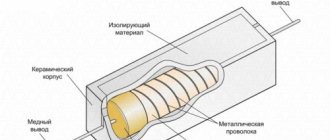In the electricity market, several entities may be involved in the sale of electricity. To determine which organization to conclude an agreement with, it is important to find out the differences between an energy sales company (ES) and a supplier of last resort (GS).
An organization that sells electricity to a subscriber at a tariff approved by the Regional Energy Commission and the Federal Tariff Service is considered a Guarantee Supplier. The key condition for cooperation with the energy supply organization is the location of the client’s connection point. The place of actual connection must be within the supplier's territory of operation.
The price of sale by the electricity supplier to the population is strictly regulated by the state and controlled by the Federal Antimonopoly Service. Such an organization works for a sales premium, the amount of which is established by the regulatory body. This supplier's custody transfer metering is maintained in accordance with the requirements of the retail energy markets.
There are a number of differences between GP and EC in: • Mechanisms for setting the price of electricity; • Commercial accounting systems; • Possibility/impossibility of refusing to conclude an agreement; • The amount of the sales premium; • Contractual terms.
Energy supply companies have a more independent position regarding energy supply. Sales organizations may refuse to conclude an energy supply agreement. This situation can happen with defaulters, as well as if the consumer does not have a technically serviceable power receiving device and others.
It is worth noting that independent energy sales companies sell electricity at a price that is not regulated by the state. If the sales organization does not serve the population, then the cost of supplying electricity is determined by agreement with the consumer.
Such an organization maintains accounting in accordance with the requirements of the wholesale electricity market, which is associated with high costs. In practice, large institutions become consumers of the energy sales company.
Retail energy market rules give consumers the ability to choose their suppliers. You can receive electricity either from an energy sales company or from a supplier of last resort operating in the given territory.
As a rule, the subscriber makes a choice in favor of an electricity supply organization, taking into account a number of criteria: connection and service conditions, tariff and consumption mode, required power and supply volumes, and others.
Differences between contracts
Let's look at the differences between an energy supply agreement and a purchase and sale agreement.
The document according to which the GP carries out the sale of electricity and also regulates relations regarding its transfer is called the Energy Supply Agreement. Whereas, under a purchase and sale agreement, only the sale of electricity is carried out.
If a subscriber draws up a purchase and sale agreement, then he has the need to record a contractual relationship with the network company for transmission services. It is worth considering that for the subscriber the final cost will remain unchanged; he will have to separately pay for the energy itself to the supplier, as well as services for its transmission to the network organization.
Since the final cost of electricity supply will not change, the consumer has the right to conclude: • Only one agreement with the GP - an electricity supply agreement; • 2 agreements with different counterparties: a purchase and sale agreement and a service agreement.
What conditions should be included in the contract?
The electricity supply contract must be complete. In any case, all standard forms that can be found on the Internet will have to be modified to suit a specific situation. Otherwise, you will lose legal support. We provide assistance with conclusions in Moscow and the Moscow region.
What conditions need to be provided:
- The amount of energy supplied over a certain period. Day, month, week. Depends on the form of the contract.
- Requirements for the quality of supplied energy. Otherwise, the organization has no right to demand payment.
- Requirements for the condition of existing electrical networks. Those for which the user, the consumer, is not responsible.
- Level of payment per unit of electricity.
- The procedure for settlements between the parties.
- The procedure for terminating an agreement between the parties to the agreement.
- Responsibilities of the consumer of energy resources.
- Responsibilities of the network organization. They are written down as clearly as possible, point by point.
- Rights of the parties.
- Network power.
- Other essential conditions. They are considered in each specific case individually.
The connection procedure and organization of technical work can also be specified in the agreement.
To apply for an agreement with an electricity supply organization, you need to prepare a package of documents.
- Citizen's passport. Or another document, identification card.
- For an individual entrepreneur: certificate of registration and tax registration.
- Electricity supply agreement with a legal entity: certificates of registration, registration. Also a charter and a document authorizing a person to act on behalf of the organization.
Additionally, design and other documentation for the facility is required. So that the network company, Mosenergosbyt, understands what is required of it and how legitimate the user’s requests are in general.
How to conclude an agreement?
Let's figure out what steps need to be completed by a subscriber who has decided to enter into an energy supply agreement with the GP.
It is worth noting that the list of documents depends on the category of consumer: utility provider, budgetary institution, legal entity. person, individual entrepreneur, individual living in an individual residential building, and a citizen of an apartment building. All necessary documents, as well as the draft agreement itself, are posted on the GP website.
For citizens living in private houses, a standard list of documents includes: 1. Application. 2. Copy of Russian passport. 3. Document on ownership of a residential building. 4. Documents on technological connection – Act on the implementation of technological connection
5. Certificate of approval of the metering device for operation 6. An electronic diagram is provided upon request. networks and other documents.
Such documents are submitted in the form of copies certified by the applicant. In practice, from the date of acceptance of the application and documents from the applicant, the supplier sends the subscriber a draft agreement within 30 days.
Standard forms of energy supply contracts
(purchase and sale of electrical energy and capacity)
- Standard form of energy supply agreement for individuals - owners/owners of non-residential non-commercial facilities PDF document
- Appendix to the standard form of energy supply agreement for individuals - owners/owners of non-residential non-commercial facilities PDF document
- Standard form of electricity supply agreement for individuals and legal entities - consumers of utility services and electricity supply, provided to residential premises in an apartment building, individual residential building PDF document
- Appendix No. 1 (Consumer consent to the processing of personal data) PDF document
- Standard form of energy supply agreement for individuals - owners/owners of non-residential commercial facilities (including in the Moscow Ring Road) PDF document
- Appendix No. 1 “List of points of supply of electrical energy (power)” PDF document
- Appendix No. 2 “List of electrical energy (power) metering devices” PDF document
For owners of microgeneration facilities
- Standard form of contract for the purchase and sale of electrical energy (capacity) for consumers: legal entities (including those financed from the budget of the appropriate level - “budgetary organizations” and individuals, including individual entrepreneurs - owners of microgeneration facility(s) PDF document
- Appendices to the standard form of an electric energy (power) purchase and sale agreement for consumers: legal entities (including those financed from the budget of the appropriate level - “budgetary organizations” and individuals, including individual entrepreneurs - owners of microgeneration facility(s) PDF document
List of documents for concluding energy supply contracts (purchase and sale of electrical energy and power) for various categories of consumers
- List of documents provided by consumer citizens for concluding an energy supply agreement in relation to non-residential facilities (buildings, premises, etc.) Microsoft Word document
- List of documents provided by consumer citizens for concluding an energy supply contract during the construction of a residential property (household), Microsoft Word Document
- List of documents and information provided for the conclusion of an energy supply contract by citizens-consumers of utility services for electricity supply (in an individual residential building (household)) PDF document
- List of documents and information provided for the conclusion of an energy supply contract by citizens-consumers of utility services for electricity supply (with direct form of management) PDF document
- List of documents and information provided for the conclusion of an energy supply agreement by citizens-consumers of public utility services for electricity supply PDF document
- List of documents provided by the owner or other legal owner of a microgeneration facility for concluding a contract for the purchase and sale of electrical energy produced at microgeneration facilities Microsoft Word document
Application form for concluding energy supply contracts (purchase and sale of electrical energy and capacity)
- Application for an individual PDF document
The procedure for concluding energy supply contracts (purchase and sale of electrical energy and power) with consumers
The procedure for concluding energy supply contracts (purchase and sale of electrical energy (power)) with consumers is regulated by the Basic Provisions for the Functioning of Retail Electricity Markets, approved by Decree of the Government of the Russian Federation No. 442 dated 04.05.2012 G.
1.
The forms of energy supply agreements (purchase and sale (supply) of electrical energy (power)) posted on the website of the supplier of last resort are draft contracts (not an offer) proposed by the supplier of last resort for conclusion with consumers (buyers), and can be used by the consumer (buyer), intending to conclude a corresponding agreement with the guaranteeing supplier or make changes to a previously concluded agreement.
Only one contract can be concluded in relation to one energy receiving device.
2.
The consumer (buyer), who intends to enter into an agreement with the guaranteeing supplier (hereinafter referred to as the applicant), provides the guaranteeing supplier with the following documents:
- Application for concluding the relevant agreement - original in 1 copy;
- A draft agreement signed by the applicant or a draft agreement signed by the applicant with a protocol of disagreements thereto - the original in 2 copies;
- Documents required for concluding the relevant agreement - the list is presented on the website for the corresponding category of consumers (buyers).
If the documents submitted by the applicant do not contain mandatory information specified by law, or if the applicant fails to provide all documents, the guaranteeing supplier within 5 working days from the date of receipt of the application for concluding a contract notifies the applicant about the missing information or documents and within 30 days from the date of receipt from the applicant of the missing information or documents is obliged to perform the actions specified in clause 3 of this Procedure.
3.
If there are no grounds for refusal to conclude an agreement, the supplier of last resort, within 30 days from the date of receipt of the application for concluding an agreement and documents from the applicant:
- if the applicant has submitted a draft agreement, signs and sends (hands over) one copy of the agreement to the applicant;
- if the applicant submits a draft agreement with a protocol of disagreements, signs the agreement as amended by the applicant or takes measures to resolve disagreements and signs the agreement in the version agreed with the applicant, or notifies the applicant in writing of the refusal to make the proposed changes to the draft agreement indicating the reasons for such refusal;
- if the applicant has not submitted a draft agreement, sends (transfers) to the applicant for signing two copies of the draft agreement signed on his part.
The applicant who received the draft contract from the guaranteeing supplier:
- in the absence of objections to the terms of the contract, signs the contract on his part (filling in the part related to information about the consumer (buyer), as well as choosing the conditions that are most acceptable to him, from those indicated in the contract in the form of a description of an exhaustive list of options) and returns one copy of the contract to the guaranteeing supplier;
- if you disagree with the terms of the contract, you have the right to send a protocol of disagreements to the draft contract to the guaranteeing supplier.
The guaranteeing supplier, within 10 working days from the date of receipt of the specified protocol of disagreements from the applicant, signs the agreement as amended by the applicant, or takes measures to resolve the disagreements and signs the agreement as agreed upon with the applicant, or notifies the applicant in writing of the refusal to make the proposed changes to the draft agreement indicating the reasons for such refusal.
In all cases of rejection of the protocol of disagreements or failure by the applicant to receive notification from the guaranteeing supplier of the results of its consideration within the specified period, the applicant has the right to submit the disagreements that arose during the conclusion of the contract to the court for consideration.
As before: first a network company
The first step in working with a network company is to submit an application. You can do this yourself or through a representative by proxy, send it by mail or bring it to a consumer service office. Network companies post a sample application in consumer service offices and on their websites.
Please attach to the application (clause “e”, clause 10 of the RF Government Regulations dated December 27, 2004 N 861):
- location plan of the power receiving device that needs to be connected;
- a single-line diagram of the applicant’s electrical networks that are connected to the energy company’s networks (can be drawn by hand);
- a copy of the document on ownership of the capital construction project or the land plot on which the objects are located;
- for legal entities – an extract from the Unified State Register of Legal Entities, for individual entrepreneurs – an extract from the Unified State Register of Individual Entrepreneurs;
- power of attorney for a representative;
- list and power of the energy receiving device;
- a copy of the consent of the management organization or the consent of the OSS MKD to organize connection - this document will be needed for a power receiving device that is located in a non-residential premises;
- signed draft agreement.
After the application is accepted, processed and approved, the network organization sends the applicant a completed and signed draft contract and technical specifications. The draft agreement is drawn up in two copies.
In the contract, the network organization lists:
- technological connection activities,
- work deadlines,
- duties of the parties,
- board size,
- provision on the liability of the parties for failure to fulfill their obligations.
The next step is to complete the work. At this stage, it is important to remember the boundaries of operational responsibility, so as not to be offended by the network company later. The network company carries out work up to the boundaries of the applicant’s land plot. Then comes the responsibility of the applicant; he carries out the work within the boundaries of the land plot himself.
After the work is completed, compliance with technical conditions is checked and an energy supply contract can be concluded.
Who should pay for utilities on ODN?
301460
Contacts Mosenergosbyt
The client can contact the service provider very quickly.
For example, if he:
- wrote a regular letter, it can be sent to the address: 117312, Moscow, st. Vavilova, 9;
- If you want to contact the service provider by email, you will have to send the letter to: ;
- wants to send a fax to the service provider, you can send it by phone, extension 6106;
- familiarize yourself with all types of services on the official website: https://www.mosenergosbyt.ru/.
In addition, operators advise the client over the phone. But only individuals can ask questions like this. Calls are accepted at the number: +7 499 550 9 550.
At the same time with:
- From 8:30 to 20:30 it is the operators who work on this line;
- 20:30 to 8:30 there is a voice self-service system.
The client can also call a short number: 13-55. But only Rostelecom subscribers located in the Moscow region can call this number.
Legal entities can also ask their question to the operator by number. In this case, the client needs to provide the number specified in the contract or in his personal account.
To summarize: concluding an agreement with this service provider is incredibly simple. The main thing is to fill out all the documents correctly and do not forget to pay bills on time. Then the client will have only positive impressions from cooperation with this service provider.
SNT participants
For participants of the SNT (garden partnership), the possibility of concluding a direct private agreement is provided. Before registration, the owner of a summer cottage will have to notify his SNT in order to receive confirmation that the house is connected to the network.
Documents for concluding an agreement:
- Application;
- Documents to confirm land ownership;
- Passport;
- Acts of separation of technical systems at home and centralized systems;
- In the absence of electricity meters, it is necessary to document the area and technical equipment of the site in order to identify the potential power of energy consumed.
Mosenergosbyt energy supply agreement with a legal entity and an individual - documents
It is possible that plans include opening a store, an enterprise, or building a residential building, the full existence of which cannot be imagined without electrical energy.
- Hold a technology event
- Apply at Energosbyt
- You will need to enter into an agreement with an organization to supply electric current.
https://www.youtube.com/watch{q}v=ytaboutru
Consideration of the application for concluding an agreement with MOESK for technological connection takes place within 4 weeks. Provided that the documentation is presented in full and with relevant information.
Sample documents
- Energosbyt imposes certain requirements on the contract. Be sure to take them into account when concluding it.
- First of all, you will need to obtain all technical documents relating to electrical energy metering units.
- The next stage involves making adjustments to the single-line project exactly in accordance with the issued technical specifications.
- The third stage is to call an inspector immediately after the electrical work has been carried out, but the power has not yet been transferred. The specialist will check the electricity metering devices and report on the possibility of their use.
- Submission of the application and execution of the contract occurs at the fourth stage.
- As for the final stage, that is, the fifth, it includes the direct transfer of power to the object.
What is the procedure for publishing a notice?
If you are in doubt whether a notice is needed, clause 29, part 1, art. 93 44-FZ requires electricity to be supplied without this document.
But notices are published in the Unified Information System if the purchase of energy supply services is carried out under clause 1, part 1, art. 93 44-FZ, that is, when ordering from natural monopolies and the central depository. When purchasing from a single supplier under clause 1, part 1, art. 93 the customer organization places a notice of order completion in the Unified Information System no later than 5 days before the conclusion of the contract.
If the energy supply contract contains information containing state secrets, the notice is not published. That is, when concluding an agreement for the supply of electricity, clause 29, part 1, art. 93 44-FZ, clause 4, part 1, art. 93 44-FZ, as well as clause 23, part 1, art. 93 44-FZ does not require posting a notice.
Pros and cons of a direct agreement with Mosenergosbyt
When the contract is concluded through an intermediary - a guaranteed supplier, all interactions and settlements with the network company are carried out by him. It's comfortable. However, direct cooperation has its advantages:
- Disruptions in supply due to dishonesty of the intermediary supplier are excluded.
- If the guaranteed supplier changes, this will not affect payment in any way. You won't have to pay bills again.
- Interaction with the energy supply company occurs directly. You can quickly resolve technical issues, make calculations, and resolve disputes regarding the quality of services.
- For large consumer companies there is the possibility of wholesale purchases.
- Clear calculations.
- Receiving only one receipt from Mosenergosbyt. When making an agreement through an intermediary, subscribers receive two receipts - this can cause confusion.
With all the advantages of a direct contract, it also has disadvantages. These include:
- If the power is exceeded by the consumer, then you will need to pay extra for this.
- The conclusion requires the collection of a package of documents.
After weighing all the pros and cons, the subscriber can decide whether to enter into a direct contract.










